Comprehensive Guide to Garden Maintenance in Deptford
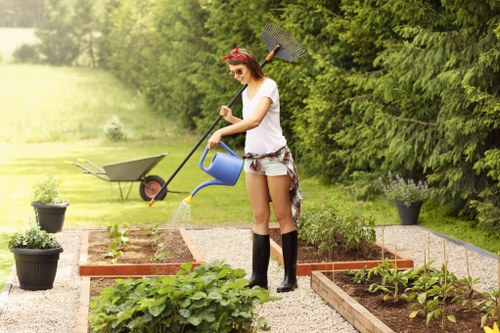
Maintaining a beautiful garden in Deptford requires a blend of passion, knowledge, and the right maintenance practices. Whether you're a seasoned gardener or just starting out, understanding the unique aspects of garden upkeep in this vibrant locale can make all the difference.
Deptford's climate, soil type, and local flora play a crucial role in shaping your garden's health and appearance. With the right strategies, you can ensure your garden thrives year-round, providing a lush and serene environment for you and your family.
In this article, we'll explore essential garden maintenance tips tailored specifically for Deptford, helping you create and sustain a stunning outdoor space.
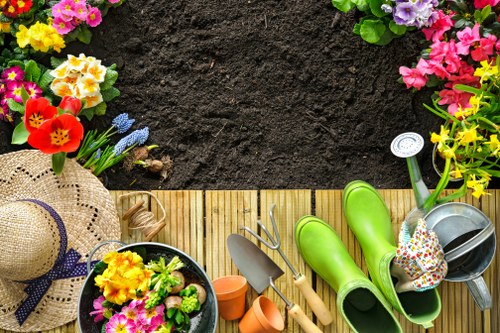
Understanding Deptford's Climate
Deptford experiences a temperate maritime climate, characterized by mild winters and cool summers. This climate influences the types of plants that thrive here and the maintenance practices you should adopt.
Temperature Fluctuations: The moderate temperature range in Deptford means that plants are generally less stressed by extreme heat or cold. However, it's essential to monitor microclimates within your garden to protect sensitive species.
Rainfall Patterns: With consistent rainfall throughout the year, ensuring proper drainage is vital to prevent waterlogging and root diseases. Incorporating rain gardens or using raised beds can help manage excess moisture.
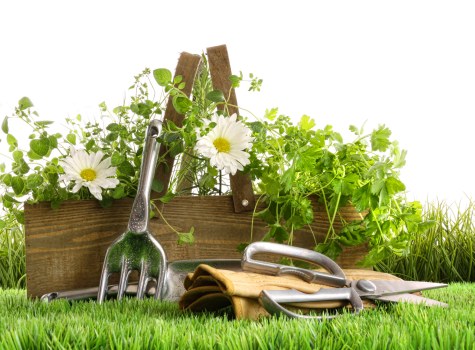
Soil Preparation and Health
Testing and Amending Soil
Healthy soil is the foundation of a thriving garden. Start by conducting a soil test to determine pH levels and nutrient content. Deptford's soil can vary, so understanding its composition helps in making necessary amendments.
- pH Adjustment: Most garden plants prefer a slightly acidic to neutral pH. If your soil is too alkaline, add organic matter like compost or peat moss.
- Nutrient Enrichment: Incorporate organic fertilizers to boost soil fertility. Compost not only provides essential nutrients but also improves soil structure.
Regularly adding mulch can also help retain moisture, suppress weeds, and enhance soil quality over time.
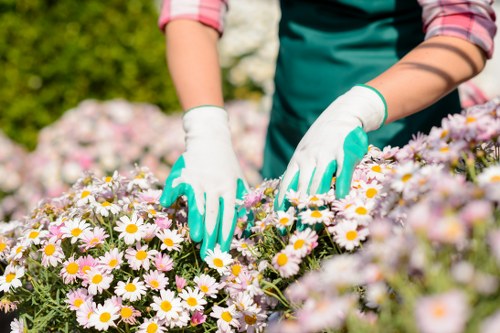
Plant Selection and Care
Choosing the Right Plants
Selecting plants that are well-suited to Deptford's climate and soil conditions is crucial for low-maintenance gardening. Opt for native species or those adapted to similar environments.
- Perennials: Plants like lavender, foxgloves, and hostas are resilient and come back year after year.
- Annuals: For vibrant seasonal color, choose marigolds, petunias, and impatiens.
- Shrubs and Trees: Incorporate evergreen shrubs and hardy trees to provide structure and year-round interest.
Regular pruning and deadheading extend the blooming period and encourage healthy growth.
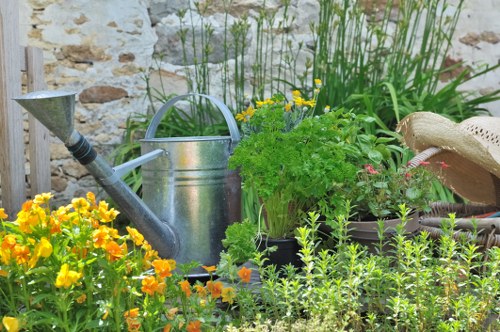
Watering Practices
Efficient Irrigation
Proper watering is a cornerstone of effective garden maintenance. Overwatering can be as detrimental as underwatering, leading to root rot and other issues.
- Early Morning Watering: Watering in the early hours reduces evaporation and allows plants to absorb moisture before the heat of the day.
- Drip Irrigation Systems: These systems deliver water directly to the plant roots, minimizing waste and ensuring consistent moisture levels.
- Rainwater Harvesting: Collecting and using rainwater is an eco-friendly way to water your garden while conserving resources.
Monitoring soil moisture regularly helps in adjusting your watering schedule to meet the needs of different plant species.
Weed Control Strategies
Weeds compete with your garden plants for nutrients, water, and sunlight. Effective weed control is essential for maintaining a healthy garden.
Manual Removal: Regularly inspect your garden and remove weeds by hand or with appropriate tools to prevent them from spreading.
Mulching: Applying a thick layer of mulch suppresses weed growth by blocking sunlight and creating a barrier.
Using pre-emergent herbicides can also reduce the germination of weed seeds, but it's important to choose products that are safe for your specific plant varieties.
Organic vs. Chemical Methods
While chemical herbicides are effective, they can harm beneficial insects and soil health. Organic methods, such as using vinegar-based solutions or natural mulches, offer safer alternatives for weed management.
Pest and Disease Management
Protecting your garden from pests and diseases ensures the longevity and vibrancy of your plants. Integrated Pest Management (IPM) is an effective approach that combines multiple strategies.
- Regular Monitoring: Inspect plants regularly for signs of pests or diseases to address issues promptly.
- Natural Predators: Encourage beneficial insects like ladybugs and spiders that prey on common garden pests.
- Organic Treatments: Use neem oil, insecticidal soaps, or garlic sprays to manage infestations without harming the environment.
Maintaining plant health through proper watering, fertilization, and pruning also helps prevent susceptibility to pests and diseases.
Lawn Care in Deptford
Maintaining a Healthy Lawn
A lush lawn enhances the overall appeal of your garden. Key lawn care practices include regular mowing, aeration, and fertilization.
Mowing: Keep your grass at an optimal height to encourage deep root growth and prevent weed invasion. Avoid cutting more than one-third of the grass blade at a time.
Aeration: Periodically aerate your lawn to alleviate soil compaction, improve water penetration, and promote healthy root development.
Seasonal Lawn Maintenance
Different seasons require tailored lawn care approaches. In spring, focus on dethatching and overseeding to fill in bare spots. During summer, ensure consistent watering and monitor for heat stress. In autumn, fertilize and prepare your lawn for the winter months.
Seasonal Garden Maintenance
Spring Tasks
Spring is the time for rejuvenation. Start by clearing any winter debris, pruning dead branches, and preparing beds for planting.
- Planting: Introduce spring-blooming flowers and vegetables to kickstart the growing season.
- Soil Preparation: Add compost or organic matter to enrich the soil.
- Pest Control: Inspect for early signs of pest activity and take preventive measures.
Summer Maintenance
Summer requires vigilant care to cope with heat and ensure plants receive adequate moisture.
Watering: Adjust your irrigation schedule to accommodate the hotter weather.
Weeding: Keep up with weed removal to reduce competition for resources.
Autumn Preparations
As temperatures drop, prepare your garden for the coming winter months.
- Leaf Management: Collect fallen leaves to prevent them from smothering plants.
- Plant Protection: Mulch around perennials and shrubs to insulate roots.
- Tool Maintenance: Clean and store gardening tools to prolong their lifespan.
Winter Care
During winter, focus on protecting your garden from frost and harsh weather.
Covering Plants: Use frost cloths or burlap to shield sensitive plants from freezing temperatures.
Pruning: Remove any remaining dead growth to encourage healthy blooms in the spring.
Hardscaping and Garden Structures
Paths and Patios
Incorporating hardscaping elements like paths and patios enhances the functionality and aesthetics of your garden.
- Material Selection: Choose durable materials such as gravel, brick, or stone that complement your garden style.
- Design: Create inviting walkways that guide visitors through different garden areas.
Regular maintenance involves cleaning surfaces and repairing any damage to ensure longevity.
Fencing and Borders
Fences provide privacy and define garden boundaries, while borders offer structure to planting beds.
Types of Fencing: Options include wood, metal, and composite materials, each offering different levels of durability and appearance.
Plant Borders: Use edging materials like bricks or metal strips to keep plants contained and create a neat appearance.
Composting and Waste Management
Effective waste management through composting recycles organic matter, enriching your soil and reducing garden waste.
Setting Up a Compost Bin
- Location: Choose a dry, shaded spot with good air circulation.
- Materials: Combine green materials (vegetable scraps, grass clippings) with brown materials (dry leaves, straw).
- Maintenance: Turn the compost regularly to aerate and speed up decomposition.
By producing your own compost, you contribute to sustainable gardening practices and enhance soil fertility naturally.
Tools and Equipment for Garden Maintenance
Having the right tools makes garden maintenance more efficient and enjoyable. Essential tools include:
- Pruning Shears: For trimming and shaping plants.
- Garden Fork: Ideal for aerating soil and turning compost.
- Hose and Sprinklers: Ensure adequate watering coverage.
- Wheelbarrow: Useful for transporting materials around the garden.
Investing in high-quality tools reduces the time and effort required for maintenance tasks.
Safety First: Always wear appropriate protective gear and handle tools with care to prevent injuries.
Professional Garden Maintenance Services in Deptford
While DIY gardening is rewarding, sometimes professional assistance can elevate your garden's appearance and health.
Benefits of Hiring Professionals
- Expertise: Professionals bring specialized knowledge and experience to handle complex maintenance tasks.
- Time-Saving: Outsourcing maintenance frees up your time for other pursuits.
- Quality Results: Skilled gardeners ensure your garden looks its best throughout the year.
If you're looking to enhance your garden without the hassle, contact us today to explore our range of garden maintenance services tailored to Deptford's unique environment.
Sustainable Gardening Practices
Adopting sustainable practices not only benefits the environment but also creates a resilient and low-maintenance garden.
Water Conservation
Implementing water-saving techniques such as drip irrigation, rainwater harvesting, and mulching helps reduce water usage and promotes plant health.
Organic Gardening
Using organic fertilizers and pest control methods minimizes chemical use, fostering a healthier ecosystem in your garden.
Biodiversity
Encouraging a variety of plant species attracts pollinators and beneficial insects, enhancing your garden's natural balance.
Embracing sustainability ensures your garden remains beautiful and thriving for years to come.
Conclusion
Maintaining a garden in Deptford is a fulfilling endeavor that combines creativity, hard work, and a deep understanding of local conditions. By following the tips outlined in this guide, you can cultivate a vibrant and healthy garden that serves as a peaceful retreat and a source of pride.
Remember, garden maintenance is an ongoing process that requires attention to detail and a willingness to adapt. Whether you're tending to flower beds, caring for your lawn, or implementing sustainable practices, each step contributes to the overall beauty and functionality of your outdoor space.
Ready to transform your garden? Book your service now and let our experts help you achieve the garden of your dreams in Deptford.
